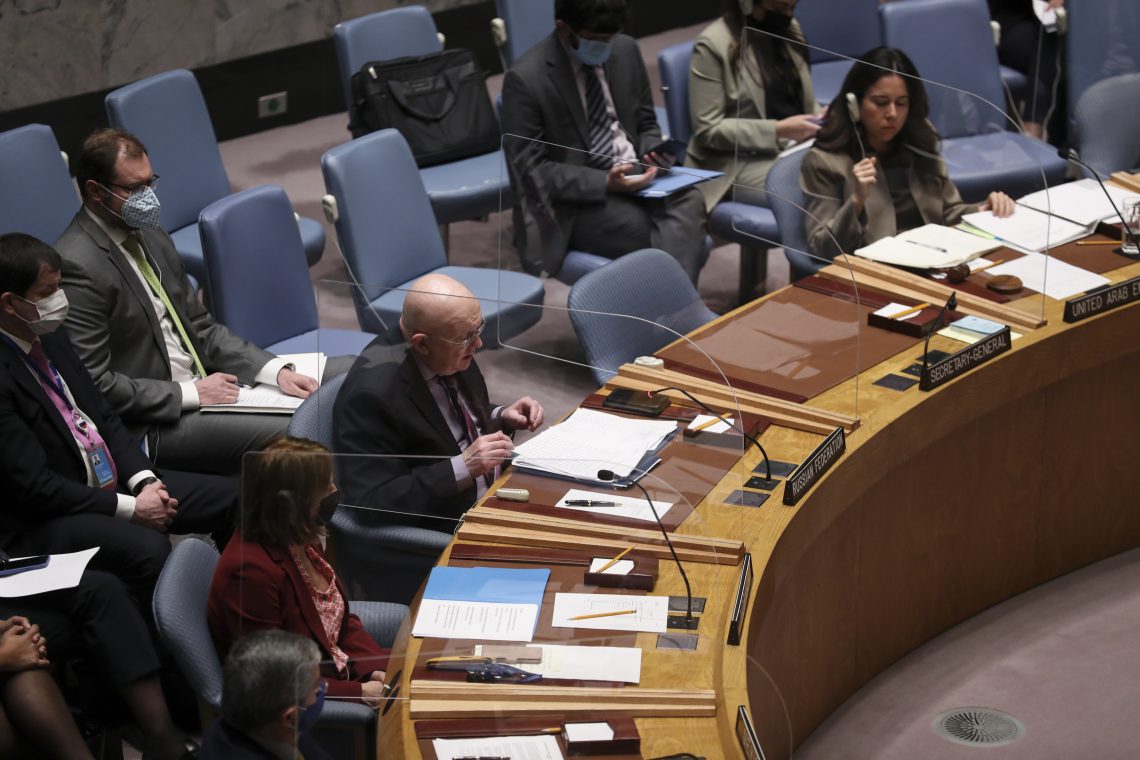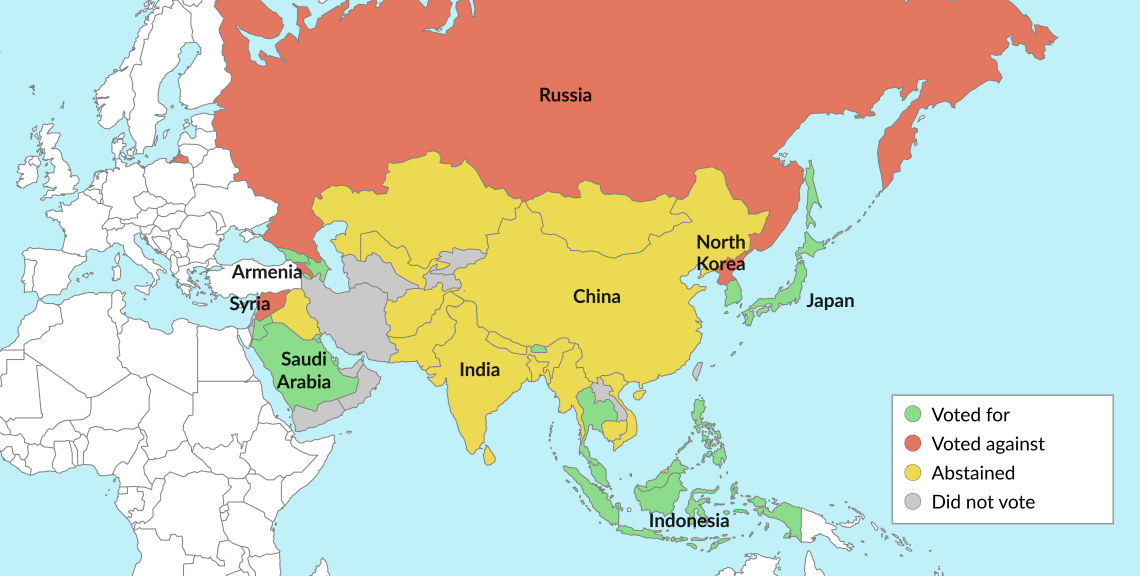A geopolitical map of Asia after the Ukraine conflict
Russia is an important player in Asia, but many states in the region also have complex economic and security ties to the West or China.

In a nutshell
- Asia is a complicated patchwork of geopolitical alignment
- Most countries in the region do not want to alienate Russia
- Still, many Asian states want stronger ties to the West
In Asia, Russia is a serious superpower contender. For Asian countries, Moscow is an economic partner, a military pacesetter and an arms dealer. But the Ukraine crisis has shown that states in the region have a wide range of attitudes toward the Kremlin.
When the United Nations General Assembly condemned Russia in early March 2022 by a vote of 141 to 4, 35 countries abstained. Armenia, Bangladesh, Kazakhstan, Kyrgyzstan, Laos, Mongolia, Pakistan and Vietnam were among them, as well as – most notably – China and India. There were also 12 countries that did not vote, including Azerbaijan, Turkmenistan and Uzbekistan.
Each Asian nation perceives the invasion of Ukraine through the prism of its relations with Russia.
This shows that Asia is not a unified geopolitical bloc. Many countries are reluctant to take a firm stance. On one hand, Asian states firmly reject foreign or international interventionism in domestic matters. But on the other hand, circumstances are changing. Russia is a hegemonic contender in Asia and yet many countries there also maintain close ties to the Kremlin. This ambivalence was reflected in the UN vote.
Each Asian nation perceives the invasion of Ukraine through the prism of its relations with Russia. For some countries, Moscow is an important trading partner or at least investor. For others, Russian-speaking minorities make up a significant part of the population. Moscow is a major arms exporter and sometimes a military example to follow. Yet other factors also play a role, including relations with China and the West.
Central Asia
Almost all Central Asian countries refrained from condemning Russia at the UN. It is not ideological ties that bind these countries to Moscow, but sheer pragmatism. The Kremlin considers these territories central to its own security. Any pushback would potentially put these states in a Ukraine-like position.
Facts & figures
Vote to condemn Russia’s invasion of Ukraine at the United Nations General Assembly

Moreover, all Central Asian countries have Russian-speaking populations and close economic and political ties to the Kremlin. Some of these states are members of the Russia-led Eurasian Economic Union. These countries also see their partnership with Russia as a lever to counter Chinese influence. In Central Asia, Moscow and Beijing are competing for influence. Countries in the region have a strategic interest in balancing the two, so they play nice with Russia.
Southeast Asia
Most Southeast Asian states, meanwhile, condemned Russia’s invasion of Ukraine at the UN. Although these countries have virtually no ties to Ukraine, the principle of noninterference is sacred to them because of their own situation. The threat of Chinese hegemony, including military intervention, looms over the region. Because of this, countries there want clear red lines. Russia is not so influential in the area; Western allies like the United States or Australia offer better protection against China. Therefore most southeast Asian states went along with the West in the UN vote.
Perhaps Xi Jinping will soon try in Taiwan what President Putin has dared to do in Ukraine.
Laos abstained, presumably because of China. Vietnam did so too, although it is wary of China and trying to grow closer to the West. But Russia is arming the Vietnamese army and doing various training and development work with the country’s navy.
Taiwan has no voice at the UN. The same West that “demands” the “security” of Ukraine wants to defend Taipei. But since not a single Western soldier has yet been mobilized there, Taiwan has put its own forces on heightened alert. Perhaps Xi Jinping will soon try in Taiwan what President Putin has dared to do in Ukraine.
China
China’s abstention at the UN General Assembly is unsurprising. Beijing does not want to cross Moscow; the Kremlin and Zhongnanhai are global partners. There are rumors that President Putin coordinated Ukraine’s invasion with President Xi. Although this is probably not true, it can be assumed that the Chinese side was informed at an early stage. In addition to these ties, China has several tangible interests at play.
First, Beijing wants to weaken the West. An embarrassment for the U.S. and the West would help China in its efforts to become the global hegemon. It would also show its Eastern European “partner countries” that the EU cannot defend them. (In recent months, there have been some difficulties with the China-led group of 16+1, the Eastern European group of countries with stronger ties to Beijing. Lithuania has even left the group.) Chinese leadership is also interested in seeing whether the Kremlin’s military doctrine will work in the event of an attack.
India
India appears to be the only country taking both sides. New Delhi relies primarily on weapons and military inventory from Russia. It is concerned that the alliance between Russia and China could become so strong that India would be left out in the cold. Over the last two years, clashes between China and India have intensified, with several skirmishes at various points along the border leading to casualties on both sides.
Outside the ivory tower of international diplomacy, condemnation means nothing.
However, in parallel India is moving closer and closer to the West. Economic ties have grown stronger, and so has security cooperation. Collaboration with the U.S., Australia, and the United Kingdom is becoming more frequent. The India-Japan axis has functioned well for years. In general, New Delhi wants a multipolar world. The fact that the U.S., Russia, and China are keeping each other in check suits the Modi administration, which believes this increases the weight of secondary powers like Japan, Australia and India. Weakening or even condemning Russia would contradict this interest.
Scenarios
Most scenarios are dependent on the positioning of Russia and China on one hand, and how much pressure the West applies on Asian countries on the other.
In a first scenario, Asian nations stick to their current alignment. This is the most probable course of events.
In a second scenario, Russia could attempt to extend its influence in Asia. In this case, a geopolitical bloc much similar to the defunct Soviet Union might emerge. This scenario is unlikely, since it is doubtful that Central Asian countries would run the risk of alienating China and India.
It is also possible that the West will exert pressure on Asian countries. This scenario is more probable than the previous one and less probable than the first. In this case, the geopolitical map would be redrawn. While some countries in Asia would find it difficult to clearly align themselves with the West because of their ties to China, others would opt for stronger alignment.
The second and third scenarios are less likely than the first one since a reshuffling of geopolitical alliances would come at risk for Russia, China, and the West. None of these powers are therefore willing to allow the conflict over Ukraine to spread to Asia. The war and related diplomatic activities are likely to remain confined to Europe.
Outside the ivory tower of international diplomacy, condemnation means nothing. For example, even Georgia and Japan will continue to find a modus vivendi with Russia despite having condemned Moscow at the UN. And Singapore, another condemner, will most likely not impose sanctions on Russia.
The most interesting feature of the vote in the UN General Assembly is that it offers a geopolitical snapshot of Asia – one that says more about broader alliances and trends than attitudes to the war in Ukraine. Asian countries’ relationships with Russia are complex and dynamic. They form a picture drawn by national interests – one where Ukraine is not even a brushstroke.








